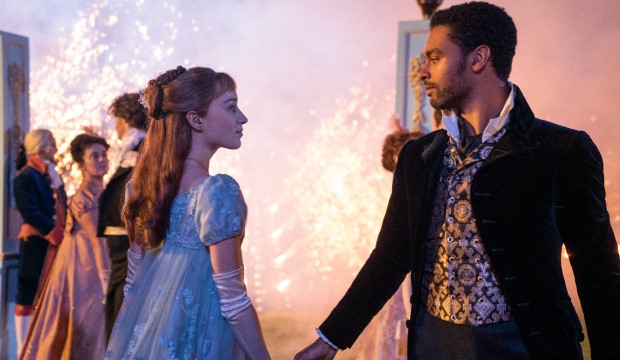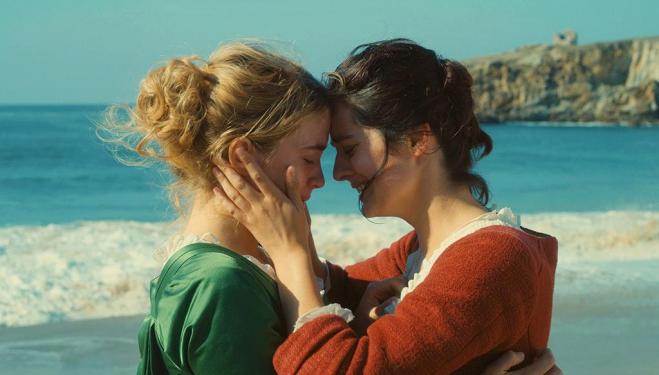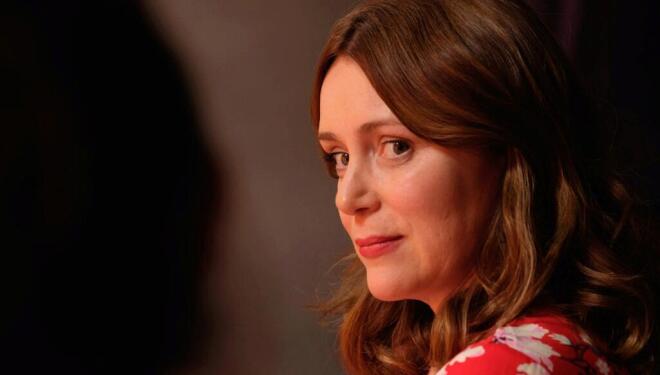
It’s a bit of journalistic cliché, in these bizarre and chaotic times, to label escapes from our current reality as ‘needed’. But, they often are. A dose of silly or fluffy or sentimental escapism allows you to switch off your brain and forget the hell that’s freezing over outside. Whether that’s good or bad, or entering a Black Mirror-like VR simulation, is up for debate, but the resulting psychological calm is incontestable.
Bridgerton is one of those bingeable shows with many such doses. This lavish period drama inspires teas and duvets and speaking with outrageously posh syntaxes. The sexy affairs, the colourful costumes, and the absurdly opulent houses and manors and palaces embrace you, comfort you. Not to mention the characters, which all have their own addictively watchable idiosyncrasies.
It's not serious television, it's guilty-pleasure telly for sure... but should you feel all that guilty? 82 million households around the world watched the first season in the four weeks after its Christmas release in 2020. In any case, this critic thoroughly enjoyed mingling in these fantastical worlds – caring completely about who offends whom, who fancies whom, and (more importantly) who sleeps with whom.

The Bridgerton family. Photo: Netflix
2. The story is familiar, but with
a scandalous twist
On the surface, Bridgerton is like Jane Austen fan-fiction penned by Americans. The ‘storytelling’ company Shondaland, helmed by Scandal and Grey’s Anatomy writer-producer Shonda Rhimes, produces the show. Rhimes was tired of the demands of network TV and made a nine-figure move to Netflix, Bridgerton being the first Shondaland drama to benefit. Writer/creator Chris Van Dusen, another American, runs the show, based on the American author Julia Quinn's bestselling novels.
Set in Regency London, the story follows families intent on marrying their daughters off to good husbands – wealth and status prioritised over love. The eldest Bridgerton daughter Daphne (Phoebe Dynevor) has come of age and must find a suitor. She knows all the strict manners and polite protocols, demonstrated in front of the irascible Queen Charlotte (Golda Rosheuvel). But she’s thrown off her feet, Mr Darcy-style, by the intolerably arrogant Duke Simon Basset (Regé-Jean Page). They start off hating each other, then become enamoured, etc.

Phoebe Dynevor as Daphne Bridgerton. Photo: Netflix
This spells a stuffy premise, the same as a thousand other period dramas. You can see the American ideas
of this British society come through, especially with Dynevor’s
performance, which heavily resembles an early-career Keira Knightley (the pout
is especially uncanny). It's almost an imitation.
But the overdone elements of the series are saved by the scandal stirred by the anonymous Lady Whistledown (voiced by Julie Andrews). The mysterious writer pens a journal revealing all the tumultuous relationships in ‘the ton’, exposing everyone’s dirty washing. And it’s very dirty indeed.

Daphne Bridgerton with the Duke Simon Basset (Regé-Jean Page)
3. The sex is wonderful
The trouble in constantly adapting, or paying obvious homage to, the classics from the 19th century is that the experience is drearily predictable. The structure is already locked into the cultural consciousness, fused into viewers' minds – even if they’ve never seen one before.
Some are still stuck in that time before sex was shaken into the costume-drama equation. Ever since, it’s been integral – elevating a tiring period piece, based only on a stiff comedy of manners, into an enticing one. You can see it in Ammonite, Portrait of a Lady on Fire; even the recent U-rated Emma is lavishly seductive.

Ruby Barker as Marina Thompson. Photo: Netflix
Bridgerton is another, though
more intriguing, example. Its sex scenes are often ridiculous –
comic as much as horny – but they’re not too gratuitous (depending on your
threshold). Although the first episode begins with Anthony (Jonathan Bailey), the eldest Bridgerton
brother and man of the house, screwing an opera singer against a tree, it takes a few episodes to get to the steamy parts. But even then, there’s none of the near-pornographic embarrassment that often burdens something like Game of Thrones.
There’s more concern in showing male bodies than female ones, and even when there is stronger nudity it’s brief and not fetishised; all while remaining brilliantly erotic. Give or take some scenes, there’s a deep and sensual sense of romance. It makes the standard plights of these young ladies even more exciting, despite few of them knowing about sex at all.

Nicola Coughlan (Derry Girls) as Penelope Featherington. Photo: Netflix
4. The colour-blind casting is a
significant step forward
There’s been plenty of discussion, on both sides of the political spectrum, about the inclusion of people of colour in British period dramas. Some think it historically inaccurate, others believe it deliberately ignores the sins of a racist past. But what is commendable, at the very least, is people of colour being cast in roles that, in previous years, they wouldn’t have been considered for.
Bridgerton follows a recent trend of colour-blind casting in period dramas. (Armando Iannucci set a big-screen precedent with his adaptation of David Copperfield.) As such, race rarely comes up in the series and Black characters are elevated to positions of power. In this society, there’s nothing unusual about that.

Golda Rosheuvel as Queen Charlotte. Photo: Netflix
There is one scene that provides a sort alt-history
explanation. Queen Charlotte is written as a woman of colour, based on the
theory that she was, in reality, mixed-race. The context proceeds on the idea
that, since race didn’t bother royalty, it shouldn’t bother the rest of society.
In some ways, this seems like an awkwardly long-winded way to try to please everyone –
especially as the story's focus still favours the white characters.
However, it is still refreshing to see this diversity in a historically white genre. It’s not only great for acting opportunities, but for the non-white audiences who’ve rarely seen themselves reflected in period dramas. Let's hope the trend continues.
Bridgerton is available now on Netflix
| What | 4 reasons why you should watch Bridgerton |
| Price | £n/a |
| Website | Click here for more information |






